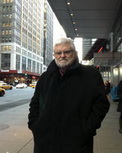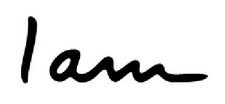 Chris
McDonnell, UK
Chris
McDonnell, UKchristymac733@gmail.com
 Chris
McDonnell, UK
Chris
McDonnell, UK
christymac733@gmail.com
Previous articles by Chris Comments welcome here
February 7, 2018

The I that is me
How
is it that each of us is known? What is the 'I' that is recognised by
others and is it the same 'i' that we recognise in ourselves? It was as 'I
am who I am' that God declared himself in the Torah
The interesting
thing about growing old is that although the external scaffolding may
change, the 'me' that each of us lives with is there from day to day and
year to year. Yet we all know that with the passing of years, our
knowledge and experience does change us, adds to the sum total of who we
are. To live a life without change would be dull and fruitless.
In an essay on the Development of Christian Doctrine written in
1845, Newman wrote 'To live is to change, and to be perfect is to have
changed often'. But what is the nature of that change and what are its
consequences? We are defined in
our early years by our family circumstances, our home neighbourhood, our
schools and to an increasing extent by our friends. These external factors
shape and influence our formative years and have long term consequences
for our future. An essential part of growing-up is finding out who we are
and to appreciate how others perceive us. We might in consequence modify
our personal image, our tastes in dress, music and speech, trying to
become more acceptable in the day to day patterns of life. Or of course we
might take an alternative view and accentuate aspects that others don't
appreciate just to be awkward. There are
occasions where declaring who 'I am' is a matter of some courage. Writing
these few lines on the birthday of Martin Luther King, it is worth
remembering that no one more than he declared fearlessly who he was and
ultimately paid the price for it. It was the
question that Mark tells us that Jesus put to his friends. 'And Jesus
went on with his disciples to the villages of Caesarea Philippi. And on
the way he asked his disciples, "Who do people say that I am?"'
In fact, throughout his public ministry, it was a recurrent theme, right
up to his appearance before Pilate when he was asked if he were King of
the Jews. The identity of
the speaker adds credibility to his or her words and we listen more
attentively. Saying one thing
and acting in a different manner is soon found out and the person involved
becomes discredited. The way we act is ultimately more important than what
we say. The phrases 'actions speak louder than words' and 'put
your money where your mouth is' succinctly sum up that position. The respect we
gain is determined by the respect we give. In fact this concern for the
well being of others is a central tenet of our Christian faith - service,
care and generosity over and above personal gain. Yet the secular society
in which we live is centred so much on the 'I' of being. The 'me' society
asks first and foremost, 'what do I get from this, what's in it for me?'
The simple instance of highly-inflated salaries for a few at the expense
of subsistence wages for others is all too evident across the world. Yet people change
with age, the 'I' that is can seem remote from the 'I' that was,
the learning curve rough and the journey long but made none the less. To
be able to ask the question 'who am I?' and get a working answer we
have to ask a supplementary one 'and what have I done?' Sometimes
it is those with few possessions that leave the greatest footsteps. January 30th
marked the 70th anniversary of the assassination in 1948 of Mahatma Gandhi
in New Delhi. He was a man without possessions other than the principles
by which he lived and urged others to live. His famous remark that 'I
like your Christ but not your Christians' emphasises that we are
recognised, not by fine words and eloquent phrases, but by the way we
react with and relate to others. It is a salutary
lesson for those who carry the name of Christ as an essential part of
their identity to realise that we have something offered to us that we
must 'be', day in and day out, ever-willing as Newman suggested to change
to make it better. Reflecting the
other day on the 'I' that was and the 'I' that is, I wrote these few
lines. Being I The I of who I am is often casually lost in the garbage and noise of each day's passing. Don't tell each other about your life belief's rather attend to being who you are in their company. END